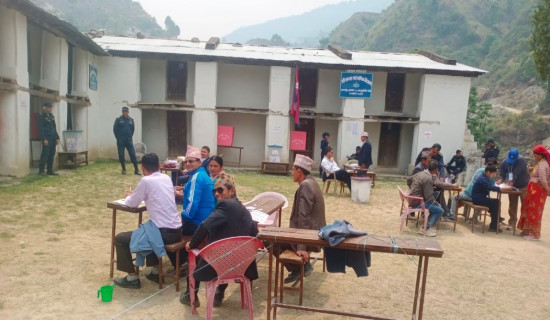- Saturday, 27 April 2024
Solve Loan Shark Issue
Despite scores of landmark political changes, sustained livelihoods for the poor Nepalis still remains a distant dream. Inability to utilise political freedom for economic prosperity has furthered entrenched the structural inequalities in the society. Today’s deepening economic troubles result from mismatch between constitution’s vision and economic policy that the state has embraced. Our economic policy gives more priority to trade than opening industries. This is why manufacturing base and agriculture production is weak. As a result, the nation has failed to absorb soaring number of youths that enter the job market annually. Gainful employment is the key to sustain not only households’ economy but also that of the nation. Chronic unemployment is breeding poverty, debt and social instability.
Tall buildings, sleek cars and wide roads in the capital hardly gloss over injustice pervasive in many rural areas. Now the underlying socio-economic inequity has come to the fore with over 1,200 usury victims protesting in the streets of downtown Kathmandu on a daily basis. These poor farmers mostly from the southern plains came to Kathmandu barefooted to draw the attention of the authorities on their economic plight. It sounds strange that they marched for 38 days to arrive from far east and far west of the country. They are now taking a shelter at Bhrikutimandap but are falling ill due to the shortage of food, proper accommodation, clean water and toilets.
The agony and sufferings of the loan shark victims imply that feudal system still exists in the villages where the people are indebted from birth to death. Absolute penury forces the villagers to secure loans from the moneylenders to meet their basic needs such as food, medical services and education. They even spend borrowed money on social and cultural activities such as weddings and festivals, sending sons and daughters abroad for jobs, building houses, paying off earlier debts and buying agriculture tools, seeds and fertilizers, among others. When the money is spent on unproductive activities, it is natural that principal amounts and their interests keep piling up.
However, there is another key reason why the debt amount grows dramatically, turning the households of debtors upside down. In Madhes, when an individual borrows Rs. 100,000, it is customary to make a contract of Rs. 300,000. But nowadays, the contract for the loan of Rs. 100,000 has been increased up to Rs 500,000 that amounts to a plundering of innocent lots in a broad daylight. As the loan shark victims began to hit the capital streets frequently, 5th round of talks between the government and the former were held but both the sides insist that the talks team lack a clear plan and vision to solve the problem.
Majority of the victims have lamented that they have not attained justice as per the existing laws and the recommendation made by the Commission on unfair transactions led by former Chairman of the Special Court Gauri Bahadur Karki. The Karki-led commission has settled 5,000 applications out of over 28,000 through mutual understanding though its task is to suggest the government about the nature of unfair transaction and way to solve them. Now the victims have felt that the government did not meet the assurances but just formed the commission to evade the problems of 30,000 loan shark victims. The National Criminal Procedure (Code) Act, 2017 has criminalised the case of loan-sharking but the high-handed lenders are not brought to book.

















